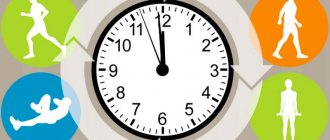Running is the most accessible and budget sport that can be practiced at any age. To start running, you don’t need special equipment or space. This sport does not require any special skills, and an ordinary park, stadium or embankment is suitable for training. During the cold season, you can use a treadmill in the gym. Jogging helps burn extra calories, improve health and mood due to the release of endorphins. But when is it better to go jogging: in the morning or in the evening? Let's try to find out.
What time of day is best to run for weight loss?
Jogging helps burn calories, get rid of excess weight, strengthen the immune system and muscle corset, develop the lungs, and improve the shape of the legs. For training to lead to results, it must be done regularly: at least three times a week, and preferably daily. It is optimal if they occur at the same time of day, so that the body gets used to constant stress and considers running as normal.
What time of day is best to run for weight loss?
What is the best time to go jogging to lose weight? It is believed that morning running helps to get a boost of energy and finally wake up, but for many, getting up early and doing physical activity at the beginning of the day is a huge stress. It’s hard to get up for work in the morning, and you’ll have to get up even earlier to go jogging. The body has not yet fully woken up and is not prepared for physical activity. For this reason, most people prefer to run at the end of the working day.
Among professional athletes and trainers, there is no clear answer as to what time is the best time to run to lose weight. Some argue that it is better to exercise in the morning, since in the morning hours immediately after sleep, the body has to take energy from fat reserves in the body. Others recommend running before bed to kick-start fat burning throughout the night. Despite discussions about the best time to workout, everyone loses weight: both those who exercise in the morning and those who jog in the evening. But for effective weight loss, jogging should be done regularly and on an empty stomach: at least three hours should pass since the last meal. If you have time and energy, you can do short runs both in the morning and in the evening to achieve the fastest results.
If you run in the morning: benefits and harms
A little later we will tell you what time of day it is better to run, in the morning or in the evening for weight loss - at what hours calories are burned faster, and now we will consider the benefits of morning jogging:
- Running in the morning helps to “wake up” metabolic processes. If you run regularly, your metabolism will work much better;
- It’s no secret that morning exercises give you vigor and energize you;
- Appetite is stimulated. After training you always want to eat, so if you don’t eat well in the morning, go to the stadium early;
- Getting up early in the name of sports greatly improves self-esteem - you must admit, not everyone is capable of this!
- While running, the joy hormone endorphin is produced, so if you ask: running in the morning or in the evening, which is better and more effective, we will choose the first, because a good mood is the key to a high-quality and productive working day.
Let's continue choosing the best time for running, and move on to the disadvantages of morning training:
- People for whom getting up early is a disaster will subject the body to extreme stress;
- Intense training will remind you of muscle pain throughout the day;
- For morning exercises, a person will have to move the time of rising back by 1.5 - 2 hours, which is fraught with regular lack of sleep.
Please note that on our website you can find a detailed article about running in the morning. In it we have collected as much information as possible about how to exercise correctly in the first half of the day to achieve maximum effect, and how useful it is.
Running in the morning and evening: pros and cons
Jogging in the morning and evening: pros and cons
Morning and evening jogging have their advantages and disadvantages.
The benefits of running in the morning
- Starting metabolic processes inhibited after a night's sleep.
- Get an extra boost of energy thanks to muscle tone.
- Improved appetite. Many people complain of poor appetite in the morning. After a running workout, significant energy costs arise, so you will need to replenish the body's spent resources.
- Raising self-esteem. After a morning run, people often look more energetic and fresher than their colleagues, which gives a feeling of some advantage.
- Getting a good mood and energy for the whole day thanks to the production of endorphin (“the hormone of happiness”) while running.
Disadvantages of running in the morning
- Stress for an unawakened body.
- You have to get up 1-2 hours earlier than usual, which can result in lack of sleep.
- Tired muscles, body pain during the working day.
The benefits of running in the evening
- Relieving stress after a hard day at work, getting rid of negative thoughts. Running is known to help calm the nervous system.
- Discharge. Relieving fatigue.
- Prevention of insomnia, good sleep. After running in the fresh air, the muscles are relaxed, so you fall asleep quickly and easily.
Disadvantages of running in the evenings
- Fatigue after a hard day at work. After a run, you may not have any energy left for your family and household chores.
- Hunger. A lot of time has passed since work lunch, so you have to choose: jogging or dinner?
If you run in the evening: benefits and harms
So, when is it better to run - in the morning or in the evening, let's move on to analyzing the benefits of evening sprinting:
- Jogging is great for calming your nerves, so it can serve as both an antidepressant and a relaxant. Sometimes, after a difficult day, we really need both;
- Running in the evening helps relieve tension and discharge, throw out accumulated negativity and stress;
- Evening jogging is a great help for insomnia.
In our search for the truth in the question “when can you run, morning or evening,” we came to the disadvantages of training at the end of the working day:
- Sometimes after a hard day there is simply no energy left for an evening sprint, but you probably still have household chores waiting for you at home;
- You can't eat before training, so you won't be able to grab a quick snack and run out to the track. If you consider that your last meal was at lunchtime, then by the evening you will be very hungry and you simply won’t have the energy to go for a run.
Which running is healthier: morning or evening?
Which running is healthier: in the morning or in the evening
? The health benefits of running have been repeatedly proven. In the absence of medical contraindications, regular exercise has the following benefits:
- Strengthening the immune system;
- Improving the functioning of the respiratory system;
- Cardiovascular training;
- Prevention of atherosclerosis, hypertension and other diseases;
- General improvement of the human body.
At what time of day is it better to run for health in order to increase the benefits and importance of training for the body? According to scientists, the most effective hours for training are: from 6 to 7, from 9 to 12, from 17 to 19. During these periods of time, the human body is at the peak of its physical activity, thanks to which the body tolerates stress more easily.
Thus, you can run with equal efficiency in the morning and evening, as well as during the day. However, choosing the right time for jogging depends not only on the recommendations of specialists, but also on your individual daily routine: work schedule, study schedule, usual time of getting up.
In addition, biorhythms play a vital role in the life of every person. So, for larks, a morning jog is associated with a surge of energy and tone, and for owls - with painful torture.
The Value of Running
The benefits of daily jogging or running every other day, regardless of what time of day you do them, are as follows:
- the risk of obesity is minimized;
- there is a fight against excess weight;
- the functioning of the cardiovascular system improves;
- glucose levels return to normal;
- the digestion process improves, the rate of absorption of nutrients increases;
- Negative emotions disappear, quality of life improves;
- minimizes the risk of developing osteoporosis and arthritis;
- physical fitness improves, the body acquires an attractive appearance, which, in turn, increases self-esteem.
Based on the results of special studies, the watches that are the most effective for jogging were identified, namely:
- from six to seven in the morning;
- from ten to twelve o'clock in the afternoon;
- from five to seven o'clock in the evening.
It is believed that running during these time periods will be most effective and easier to accept by the body. However, we are all individual, so you should adapt to yourself, run at a time when it is convenient for you.
The influence of biorhythms on running time
To understand what time is best to exercise, listen to your own biological clock. They determine what time it is better for you to be physically active and lead an active lifestyle, and when it is better to rest.
If the thought of a morning jog makes you sad and disgusted, you shouldn’t force your half-asleep body and push it out at 6 am to exercise. Such training will do more harm than good, as it will negatively affect the nervous system. In this case, it is better for you to go jogging in the evening. Jogging after a working day will help you get rid of stress accumulated at work and relax your muscles before going to bed. By the way, evening running is a good prevention of insomnia.
The influence of biorhythms on running time
If getting up early and being physically active makes you feel energetic, energized and in a good mood for the whole day, then a morning jog is ideal for your biorhythms. For those who live according to the morning person's schedule, the peak of physical and business activity occurs in the first half of the day. At the same time, the fatigue accumulated during the day can cause irritation at the mere thought of an evening jog.
In addition, there are people who are far from ornithology. They go to bed and get up at a time convenient for them, depending on their work mode. If you fall into this category, you may find it convenient to run during the day if your daily routine allows.
If you go against your biological rhythms, you can cause harm to your health. It doesn't make much difference what time of day is best to run, the main thing is to do it regularly. Remember that training should be carried out with desire and pleasure, and then it will bring maximum benefit to your body.
When to run to lose weight
Many people are interested in the question, which running is more effective for losing weight?
- It is important to understand that any physical activity helps burn calories, which consequently affects weight loss. However, to achieve the effect, regular training is required, at least three times a week, but if you want to lose weight, it is better to run daily.
- It is also important to accustom yourself to jogging at the same time, so that the body is adapted to it and is ready to increase the load at the same hours. Then running will be perceived as normal and running will be much easier.
- It is believed that morning jogging contributes to the final awakening and acquisition of vigor. However, a person must force himself to get out of bed early and go for such a run. Not everyone can do this, because it is a serious stress for the body, many find it difficult to wake up for work, and they will have to get up even earlier to run. And this may become a reason to stop running, and then the idea of losing weight will be a failure.
- In fact, if you have strong enough willpower, then it doesn’t really matter what time of day you run. Experts have differing opinions regarding this issue. Some are convinced that it is better to run in the morning, since the body consumes energy by wasting fat reserves. While others are convinced that evening jogging is more effective, it starts the fat burning process, which continues throughout the night. Therefore, it is better to choose the option that suits you best.
When you run for the purpose of losing weight, you must understand that there are different types of running, and each has its own nuances.
- Simple - running at medium speed for short distances.
- Progressive. You need to start running at an average speed, gradually increasing its intensity. Most of the time should be moderate running.
- Long. Average speed over long distances.
- Interval. A combination of fast running with jogging or race walking. In this case, you need to maintain a high speed for 30 seconds, then switch to a two-minute slow jog. A minimum of five approaches are required.
- Fast - running at top speed. It is believed that it allows you to achieve results in the process of losing weight the fastest.
It is recommended to run to lose weight:
- two hours after meals or on an empty stomach;
- jogging should last at least 20 - 35 minutes;
- pace is moderate or fast.
If you want to lose weight, you must understand that, in addition to running, you need to make other adjustments to your life:
- change your diet (you should replace fast carbohydrates with slow ones, drink as much water as possible (according to your body weight), reduce the content of sweets and baked goods in your diet, monitor the level of calories consumed);
- adhere to the correct routine, sleep at least seven hours a day;
- get rid of all bad habits.
What is the difference between morning and evening workouts?
Since there is no general consensus on the best time to run, we need to consider all the pros and cons.
Most people have a hard time waking up in the morning, and running in the morning will help you quickly get a boost of energy for the whole day. The advantages of a morning jog are:
- The environment on the street is calmer and you have the opportunity to focus on your inner feelings.
- There is an opinion that the air is cleaner in the morning - during the day it becomes filled with smog.
- If you have a goal to lose weight, it is better to run in the morning, since metabolic breakdown processes occur at night, of course, provided that the person does not run to the refrigerator in the middle of the night.
- Morning jogging gives you energy.
But there are also disadvantages:
At night, the body rests, and the blood becomes thicker - a morning jog increases the load on the heart. This is stress for the body that has not yet woken up, so you need to listen very carefully to your feelings.- In the morning, you will have to spend more time on warming up, since immediately putting a strong load on the body in a still calm state, you can subject it to severe overexertion, which is undesirable.
- Most people are simply too lazy to get up in the morning and run, and they completely abandon this sport.
There is romance in running in the evenings - running under the dim lights and listening to your favorite music is much more pleasant, but these are not all the advantages of evening running:
- There is still a lot to do in the morning, and in the evening after a run you can relax and regain your strength overnight.
- In the evening, the risk of injury is reduced - during the day, the muscles and joints warm up well, and running will be easier than in the morning.
- While running in the evenings you can take your mind off problems after a busy day, but in the mornings a person usually plans his day and cannot relax.
- It’s much easier to get ready for a run in the evening - you don’t need to rush so as not to be late for work.
Minuses:
- People who are prone to insomnia should not run in the evenings. Running is a tonic for the body, and if you have problems sleeping, you can lie in bed for a long time in an unsuccessful attempt to fall asleep.
It is not very convenient to run in the morning if a person has irregular working hours. It’s easier to plan your day in the morning, but during the day these plans may change, and there may simply not be enough time for a run.- The air in the evenings is not so clean, which of course will not improve your health.
Reference! To choose the optimal time for running, you need to find an option that will have more advantages than disadvantages.










